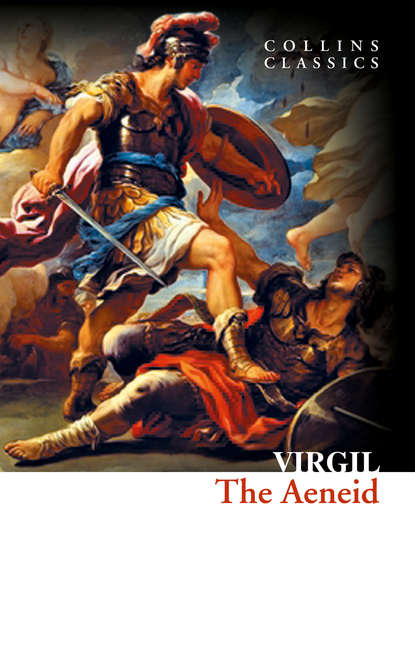On his high chariot driving o’er the slain.
The tents of Rhesus next his grief renew,
By their white sails betray’d to nightly view;
And wakeful Diomede, whose cruel sword
The sentries slew, nor spar’d their slumb’ring lord,
Then took the fiery steeds, ere yet the food
Of Troy they taste, or drink the Xanthian flood.
Elsewhere he saw where Troilus defied
Achilles, and unequal combat tried;
Then, where the boy disarm’d, with loosen’d reins,
Was by his horses hurried o’er the plains,
Hung by the neck and hair, and dragg’d around:
The hostile spear, yet sticking in his wound,
With tracks of blood inscrib’d the dusty ground.
Meantime the Trojan dames, oppress’d with woe,
To Pallas’ fane in long procession go,
In hopes to reconcile their heav’nly foe.
They weep, they beat their breasts, they rend their hair,
And rich embroider’d vests for presents bear;
But the stern goddess stands unmov’d with pray’r.
Thrice round the Trojan walls Achilles drew
The corpse of Hector, whom in fight he slew.
Here Priam sues; and there, for sums of gold,
The lifeless body of his son is sold.
So sad an object, and so well express’d,
Drew sighs and groans from the griev’d hero’s breast,
To see the figure of his lifeless friend,
And his old sire his helpless hand extend.
Himself he saw amidst the Grecian train,
Mix’d in the bloody battle on the plain;
And swarthy Memnon in his arms he knew,
His pompous ensigns, and his Indian crew.
Penthisilea there, with haughty grace,
Leads to the wars an Amazonian race:
In their right hands a pointed dart they wield;
The left, for ward, sustains the lunar shield.
Athwart her breast a golden belt she throws,
Amidst the press alone provokes a thousand foes,
And dares her maiden arms to manly force oppose.
Thus while the Trojan prince employs his eyes,
Fix’d on the walls with wonder and surprise,
The beauteous Dido, with a num’rous train
And pomp of guards, ascends the sacred fane.
Such on Eurotas’ banks, or Cynthus’ height,
Diana seems; and so she charms the sight,
When in the dance the graceful goddess leads
The choir of nymphs, and overtops their heads:
Known by her quiver, and her lofty mien,
She walks majestic, and she looks their queen;
Latona sees her shine above the rest,








 Рейтинг:
0
Рейтинг:
0